The future of eating well is right under our feet.
By Yolanda Navarra
Everyone used to say my grandmother should have opened a restaurant.
Instead, she married a man with an eight-acre apple orchard and evergreen farm in Holmdel, where he also grew organic vegetables, fruits and flowers. The farm was a magical place and their marriage—farmer and chef—made their house a farm-to-table paradise for me. Whenever she called, I’d squint my little eyes and hold my breath, hoping, for a dinner invitation, which was usually a creative feast of whatever she’d collected from the farm that morning. The first time I ever tasted a Jerusalem artichoke, I was an 11-year-old who couldn’t get enough of unusual flavors. I lived for them. I’ve never forgotten the smell of spices in the kitchen or picking apples from trees, and looking out at the land wondering what might be ready to harvest. All these years later, the flavor of that first Jerusalem artichoke is still on the tip of my tongue.
A New Jersey upbringing doesn’t make me a foodie any more than being hungry for just-picked produce makes me a farmer. Yet with the thousands of farms—and farmers markets and farm-to-table restaurants—dotting the Garden State, I am hardly alone in my obsession for eating local.
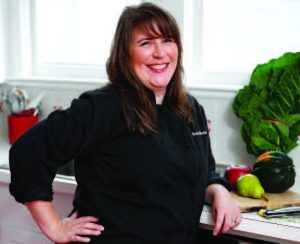
Courtesy of Rachel Weston
The state’s official website celebrates the fact that New Jersey continues to live up to its nickname. Our farmers are producing quality crops. While food and agriculture is our third largest industry, New Jersey ranks highest in the production of cranberries, spinach, bell peppers, blueberries and peaches. We also raise famously delicious Jersey tomatoes, corn, apples, strawberries, potatoes, hay, soybeans and nursery stock. Jersey Fresh, a 33-year-old program sponsored by the New Jersey Department of Agriculture to educate consumers about the state’s crops, reports that our farmers grow more than 100 varieties of produce and hundreds of thousands of dollars worth of specialty crops. As of 2015, we have 9,100 farms spread out over 715,000 acres of land that generated $1.02 billion in sales the previous year
Rachel J. Weston, chef and author of New Jersey Fresh: Four Seasons from Farm to Table, (the subject of a 2015 EDGE story), says, “If you haven’t eaten corn harvested that same morning, strawberries still warm from the sun or tomatoes just brought in from the field; you haven’t experienced the bounty of the Garden State…[and] when farmers and chefs collaborate together on showcasing Jersey Fresh products in a meal the results are memorable.”
Weston recommends preserving summer and fall produce for winter by making jars of jams, pickles, chutneys, salsas and tomatoes that will be ready to go even if the ground is frozen. In fact, her freezer is stocked with local berries, peaches, pesto and eggplant. Winter finds her cooking with storage crops, including potatoes, carrots and winter squash. She also can’t resist shopping at farmers markets for various mushroom varieties, which are grown in climate-controlled greenhouses
“I supplement a bit from the grocery store,” she concedes, “but with some planning and creativity, it is possible to eat well year-round.”
But it’s not only about the food; Weston also enjoys the personal connection. “Shopping directly from farmers and through a season-long C.S.A. (Community Supported Agriculture, aka “farm share”) program or a visit to a roadside stand provides the opportunity to meet the people who grow our food, learn how it is grown and the opportunity to have fresher, more flavorful options, while supporting our local economy.
FARM TO MARKET
There’s an inherent magic and entertainment value to shopping at a farmers market that the average grocery store can’t offer—coupled with the freshness and immediacy of the food and where it was born. Farmers markets typically offer more than just produce. Eggs, cheese, meats, breads, grain, mushrooms, wine, honey and more are all part of New Jersey’s agricultural output
“I’m a big believer in you get what you pay for…and when you shop at a farmers market, you get the relationship built into that price,” says Chris Cirkus, who manages the West Windsor Community Farmers Market, and also works part-time at the New Jersey Department of Agriculture as the Farm-to-School Assistant Coordinator. Unlike a chain grocer, she adds, farmers market products are competitively priced: “Folks are very mindful of what they can spend on groceries, so we really focus the market on those offerings.” Cirkus also volunteers at Greenwood Ave. Farmers’ Market in Trenton—which was created for food access and health services and is run by the Trenton YMCA—and consults for the 31 & Main Farmers Market at Campus Town, in front of The College of New Jersey
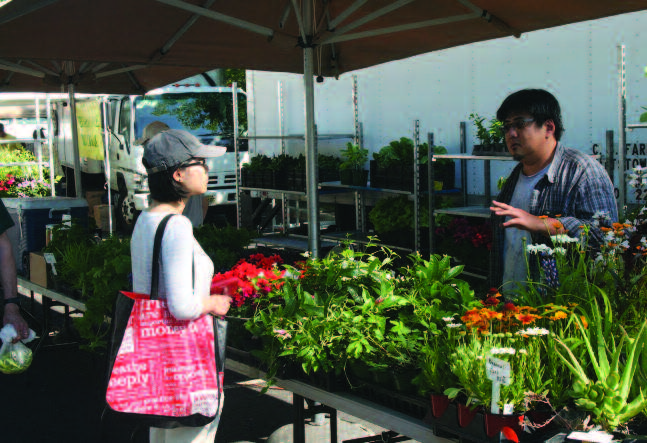
Photo by Chris Cirkus
New Jersey is home to more than 150 farmers markets. Each market is a separate entity; therefore no two are created equal. They can vary in their number of vendors and have their own rules. For instance, some may prohibit anyone other than farmers themselves from vending; in other words, no distributors are allowed. Others prohibit the sale of non-food items. It all depends on the shared vision of the organizers, who can be anyone from community members to townships to businesses.
The West Windsor market, a non-profit organization, began in 2004 and is run by community members. In spite of the township’s support, they operate independently. The market currently features around a dozen vendors, including bakers who use local flours and fruit; a pasta maker who uses local grain and vegetables; ketchup and sauces made with New Jersey tomatoes; jams sourced from local fruit; pickles, and pickled vegetables made with New Jersey vegetables. Two food trucks offer breakfast and lunch using local meat, eggs, and vegetables
The great equalizer is the good intention. Ideally, each market exists to support the community that hosts it. The markets that fail often lack either support, passion, or both. Not every town should have a farmers market, Cirkus says. It depends upon, among other things, what farm stands are nearby.
“Farmers markets don’t typically allow distributors; that’s the point,” she says. “It’s about creating community, engaging with the folks who grow, raise and produce the food.
“It all comes back to the farmers for us, and how we can ultimately highlight them across the entire marketplace. There are statistics about shopping locally and the percentage of a dollar that stays in the local economy when supporting small farms and business. I think it is something like two-thirds of each dollar. If that’s not enough of an incentive to shop at your local farmers market, perhaps the relationship with the farmer or vendor who grew, raised or produced that food is.”
FARM TO TABLE
Can you imagine a world where diners cared about the origin of their food? I can, and I love what that looks like. Farm-to-table establishments would be commonplace and restaurateurs would embody the farm-to-table lifestyle. Farm-to-table would no longer be a movement. It would be a fact of life.
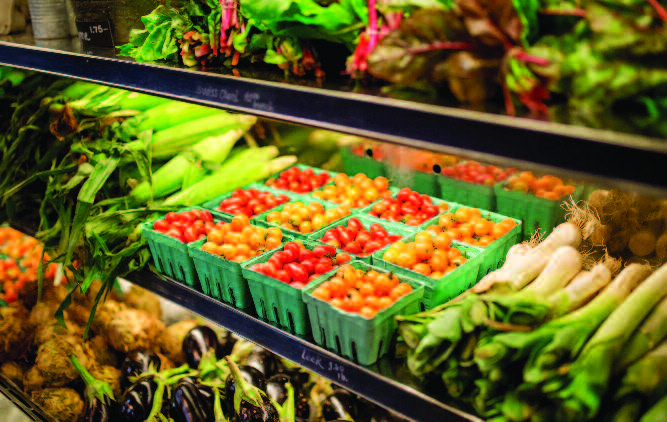
Courtesy of Beach Plum Farm

Courtesy of Beach Plum Farm
Jim Nawn, owner of the Fenwick Hospitality Group, which produces The Dinky Bar & Kitchen, Main Street Catering & Events, Cargot Brasserie (opening this spring) and Agricola Eatery (agricola is the Latin word for “farmer”), developed 112 acres of farmland in Skillman known as Great Road Farm to supply seasonal, sustainable, antibiotic-free ingredients—including more than 120 vegetable varieties. They have been certified organic for the past two years. “I believe our number-one goal is great-tasting food,” says Nawn, who formerly owned and operated 37 Panera Bread franchises in North Jersey. “I also believe that local and organic produce leads to optimal taste, when we can grow in our limited growing season and in balance with costs .”
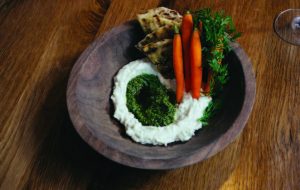
Photo by Fenwick HG
A similar blueprint for success can be found in Cape May, where Curtis Bashaw (above) is co-managing partner of the Cape Resorts Group, which relies on Beach Plum Farm to supply food for the group’s establishments: The Ebbitt Room, Blue Pig Tavern, Rusty Nail, Boiler Room, Exit Zero Cookhouse and Louisa’s Café, all of which are within two miles of the farm. “We bought this farm with the vision of growing food for our restaurants in Cape May,” Bashaw says. “People love to get in touch with where their food comes from and with the natural setting here, just a mile from the Atlantic Ocean.”
The eight-year-old, 62-acre farm supplies most of the produce for all the restaurants, including more than 100 fruit and vegetable varieties, herbs and flowers. Beach Plum Farm even has a kitchen that serves salads, sandwiches and fresh juices. In this case, fresh is synonymous with extraordinary flavor, says Bashaw. “You cut the asparagus at 6:00 in the morning and you are eating it in a salad in the Blue Pig Tavern by lunchtime. That’s pretty fresh. The flavors just pop in a way most people aren’t accustomed to.”
Chef David C. Felton of Ninety Acres relishes what was once his young chef’s dream of having a farm so near to the table, which has become part of his daily mission. Ninety Acres is yet another farm-to-table gem, located in Peapack-Gladstone. Set on sprawling Natirar, the 90-acre portion of a larger property that once belonged to King Hassan II of Morocco, it now has a farm that feeds the restaurant. About 250 chickens supply fresh eggs. Berkshire/Duroc pigs lend to the farm’s sustainability by gobbling up the pre-plate cooking scraps from the restaurant, while sheep graze their way through the cover crops. For composting, the litter from the sheep and pigs are consumed for vital nitrogen, as well as food scraps and non-toxic wood chips and leaves from a nearby county park.
Felton can imagine a more food-conscious existence, too: “I think we’d revert back to a simpler time, when food was more precious and neighbors were more civilized. People used to grow their own food, or knew the people that grew it for them. There was a shared concern for quality ingredients that could feed not just a family, but a community. If everyone cared about their food’s origin, I think personal connections would be strengthened. There would be more communal dining with real conversation, rather than chatter with emoticons.”
Eric LeVine (above right) is among the growing number of New Jersey chefs who rely on local growers for the bulk of their ingredients—which in turn influences their menu offerings. LeVine, chef and partner at Morris Tap and Grill in Morristown and Paragon Tap and Table in Clark, says he is inspired by nature. “Our menu rotates seasonally,” he explains, “so we focus on spring/summer and fall/winter. We change things depending upon what the farmers have to offer and take advantage of what’s available. For example, when corn is at its peak, we’ll grab a couple of bushels and use them in a dish like corn salad or corn risotto.”
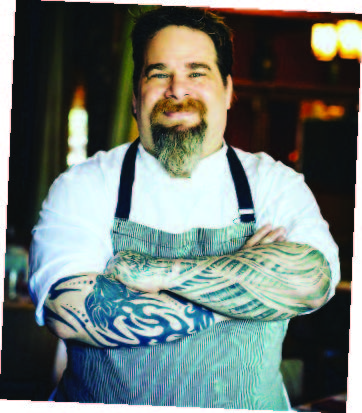
Courtesy of Morris Tap and Grill
The winner of Food Network’s Chopped in 2011, LeVine has partnered with Happy Harvest Hydro Farms in Denville for his supply of greens. Its method of hydroponic farming is a soil-free, insect-free and completely non-toxic approach to growing. He buys other produce from the century-old Donaldson Farms in Hackettstown. What’s most important is getting the right products without going too far afield, LeVine points out: “We source local poultry from a hormone- and cage-free farm in Pennsylvania. All of our fish and meats are from sustainable farms.”
Driven by what he calls an “insane passion,” LeVine has worked in the food industry for the past 37 years. At times, he’s experienced the challenges of scoring enough of the consistently high-quality food he needs to run his businesses. “It’s tough at times because all you want to do is help farmers with their products, but it’s a balancing act.”
Consider the fact that a patron may ask for a slice of tomato on his burger in the off-season. LeVine says, “If the American palate didn’t always demand it, I’d never offer tomatoes this time of year!”
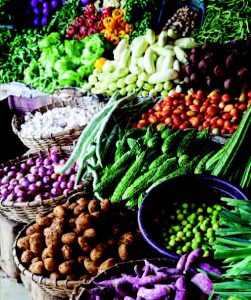
www.istockphoto.com

Upper Case Editorial
WHAT’S IN A (NICK)NAME?
The nickname on your license plate dates back to a speech delivered at the 1876 Centennial Exhibition in Philadelphia. Abraham Browning (below) of Camden described New Jersey as a “Garden State”—an immense barrel filled with good things to eat and open at both ends. Benjamin Franklin made a similar observation decades earlier.
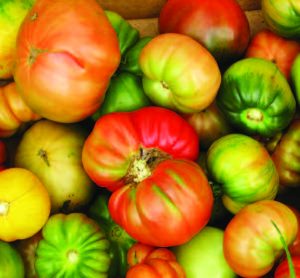
Courtesy of Rachel Weston
JERSEY TOMATOES
New Jersey farmers have been growing tomatoes since the 1920s. Now, there are hundreds of varieties. But the quintessential Jersey tomato, the Rutgers 250 (named for Rutgers University’s 250th anniversary), is considered delicious enough to bite into like a piece of fruit so the sweet juice drips down your chin. Rutgers tomatoes, among the most popular Jersey 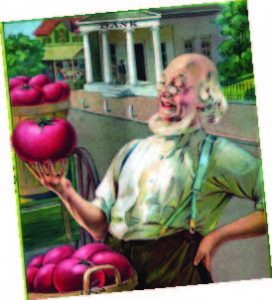 varieties, were once commercially grown specifically for canning—think Campbell’s Soup in Camden. The seeds can still be purchased for growing in your own garden.
varieties, were once commercially grown specifically for canning—think Campbell’s Soup in Camden. The seeds can still be purchased for growing in your own garden.
Editor’s Note: Eric LeVine demonstrates his commitment to sustainability, his community and his customers through education. Look for classes this spring and summer on farm-to-mouth cooking on his website, www.chefericlevine.com.




